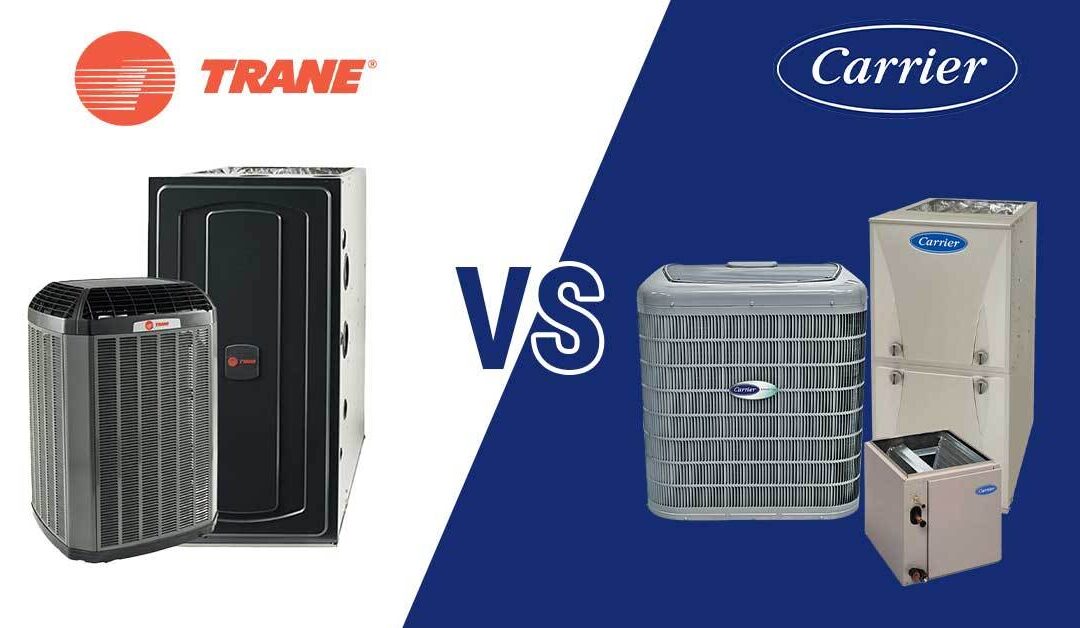
Choosing the right HVAC system for your domestic or business can be a challenging task. Two of the most well known and dependable brands in the market are Trane and Carrier. Both brands offer high-quality frameworks, but each has its qualities and unique highlights. This blog will offer assistance you get it the differences between Trane and Carrier HVAC systems, centering on heaters, warm pumps, and discuss conditioners.
Understanding the Issue: Trane vs Carrier HVAC System Selection
When selecting an HVAC system, homeowners and businesses often confront a few key considerations:
- Energy Productivity: How much vitality does the framework consume?
- Cost: What is the initial cost, and what are the long-term upkeep expenses?
- Performance: How well does the system warm or cool the space?
- Durability: How long will the system last?
- Noise Levels: How calm is the system amid operation?
- Installation and Support: How simple and affordable is it to introduce and keep up the system?
- Warranty and Support: What kind of warranty and client back does the brand offer?
Energy Effectiveness and Performance
Carrier is known for its tall vitality efficiency, with Diviner (Seasonal Vitality Efficiency Proportion) evaluations coming to up to 24 for their best models. This productivity interprets into lower vitality bills and a diminished natural footprint. Carrier’s variable-speed technology too guarantees steady comfort by altering cooling and warming yield to match your needs.
Trane, on the other hand, offers systems with Seer ratings up to 22. While slightly lower than Carrier, Trane units are famous for their robust performance and reliability. Trane’s unique Climatuff compressors are planned for long-lasting toughness, often making Trane a favored choice for those seeking a system that can withstand harsh conditions and heavy usage.
Cost and Value
When it comes to fetched, Carrier systems generally offer a more affordable forthright cost compared to Trane. Carrier Air conditioners run from $2,500 to $7,500, while Trane units regularly begin at a higher price point. In any case, the initial cost should not be the sole determining factor. Trane units, though more costly, are often justified by their longer lifespan and lower maintenance costs .
Why Are Trane Units More Expensive?
Trane systems are generally more costly due to their high-quality materials, thorough testing, and robust construction. Trane’s investment in durability and performance ensures that their systems can last longer and perform more reliably beneath various conditions.
Durability and Maintenance
Both Carrier and Trane are highly solid, but Trane units are particularly famous for their rough development and long life expectancy. Trane frameworks can last between 15 to 20 years with proper upkeep, while Carrier systems have a lifespan of about 12 to 17 a long time. Regular maintenance is fundamental for both brands to guarantee ideal execution and life span. Carrier has a comprehensive merchant arrangement for service and repairs, whereas Trane offers the Trane Comfort Specialist program to guarantee expert maintenance and troubleshooting.
Noise Levels and Installation
Carrier air conditioners and heaters are celebrated for their calm operation, making them perfect for private ranges where commotion can be a concern. Trane systems also emphasize quiet operation but may be somewhat noisier than Carrier units. Establishment is another significant perspective; Trane frameworks frequently require proficient dealing due to their complexity, while Carrier units are generally less demanding to install.
How Does Installation Affect Performance?
Proper installation is basic for the performance and efficiency of HVAC systems. Trane units, with their complex plan, often require proficient installation to ensure they work correctly and effectively. Destitute installation can lead to reduced efficiency and expanded wear and tear, shortening the system’s lifespan.
Warranty and Support
Both brands offer fabulous warranty options. Carrier provides a 10-year parts restricted guarantee, with a few models offering a 20-year warranty on warm exchangers. Trane moreover offers a 10-year warranty on parts and a noteworthy 12-year warranty on compressors. Both companies have vigorous client back systems, including 24/7 help and extensive benefit networks.
Comparing Heaters: Trane vs. Carrier
Carrier Furnaces:
- Infinity 98 Gas Heater: Known for its vitality effectiveness and calm operation, this heater employments Green speed Insights for exact temperature control.
- Performance 96 Gas Heater: This show is more reasonable whereas still advertising tall effectiveness and solid performance.
Trane Furnaces:
- XC95m Gas Furnace: Offers up to 97.3% AFUE (Annual Fuel Utilization Effectiveness) and is planned for greatest productivity and comfort.
- S9V2-VS Heater: Highlights a variable-speed blower and tall efficiency, making it ideal for steady and comfortable heating.
Heat Pumps: Trane vs. Carrier
Carrier Warm Pumps:
- Infinity 24 Warm Pump: Carrier’s most advanced demonstrate with variable-speed innovation for vitality proficiency and calm operation.
- Performance 17 Heat Pump: A more reasonable alternative that still provides amazing warming and cooling efficiencies.
Trane Warm Pumps:
- XV20i Variable Speed Warm Pump: Known for its effectiveness and calm operation, advertising up to 20 SEER.
- XR16 Warm Pump: Gives strong execution and proficiency at a more reasonable cost point.
Air Conditioners: Trane vs. Carrier
Carrier Air Conditioners:
- Infinity 21 Central Air Conditioner: Tall Soothsayer rating and great stickiness control.
- Performance 17 Central Air Conditioner: Balanced choice offering great performance and efficiency at a reasonable cost.
Trane Air Conditioners:
- XV20i TruComfort Variable Speed Air Conditioner: Offers up to 22 Diviner and variable-speed technology for ideal efficiency and comfort.
- XR14 Air Conditioner: A more reasonable choice with strong execution and reliability
Read More About: Trane VS Daikin
Conclusion:
The choice between Trane and Carrier depends largely on your particular needs and inclinations. If you prioritize vitality efficiency and lower forthright costs, Carrier might be the better option. However, if you esteem durability and are willing to invest more at first for a longer-lasting system, Trane could be the right choice.
Always consult with a professional HVAC contractor to assess your specific requirements and ensure you select the best system for your home or business.
By understanding these key differences, you can make an informed decision and enjoy reliable, efficient, and comfortable climate control for years to come.








